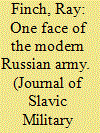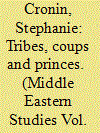|
|
|
Sort Order |
|
|
|
Items / Page
|
|
|
|
|
|
|
| Srl | Item |
| 1 |
ID:
106455


|
|
|
|
|
| Publication |
2011.
|
| Summary/Abstract |
This article will examine General Shamanov's background, the probable rationale for his assignment as airborne commander, his role in the ongoing reform of the Russian military, and the possible future implications for the Russian military and state. This biographical sketch suggests that Shamanov represents a portion of the modern Russian officer corps. These officers (from a variety of security agencies) have merged state, business, and private interests, resulting in a distortion of traditional civil-military relations. As a high-level advisor, and now as Airborne Commander, General Shamanov continues to influence the course of military reform. There is speculation that General Shamanov could become the next Minister of Defense. While the Russian military has a long tradition of remaining outside politics, if the domestic situation in Russia were to become dire, General Shamanov could help choose, or even become, the next Russian commander-in-chief.
|
|
|
|
|
|
|
|
|
|
|
|
|
|
|
|
| 2 |
ID:
121454


|
|
|
|
|
| Publication |
2013.
|
| Summary/Abstract |
In the decades following the First World War, countries such as Iran, Iraq and Afghanistan used the creation of a modern army as an engine for wider processes of change. Such military-led state-building followed a precedent established in the previous century by Egypt and the Ottoman Empire. In these countries, military revolutions involving the introduction of new technologies and military tactics made essential broader transformations in tax, administrative and educational structures to finance the army and provide literate manpower. In Saudi Arabia, however, no such military revolution, dragging society in its wake, took place. Military expansion was funded not by domestic taxation but by oil royalties provided by a foreign concession, recruitment remained voluntary, avoiding the administrative centralization and bureaucratic rationality demanded by conscription, while both the integrative function of conscription and the emergence of a professional officer corps were sacrificed to the imperative of sustaining the tribal and family ascendancy of the al-Saud. Saudi Arabia entered the twenty-first century having experienced not military modernization but rather military modernization in reverse, the strength of tribal and family ties and patronage not weakened but rather embedded ever more deeply within a system of patrimonial rule.
|
|
|
|
|
|
|
|
|
|
|
|
|
|
|
|
|
|
|
|
|